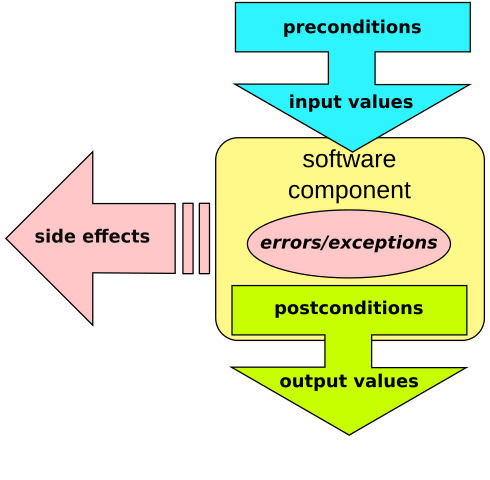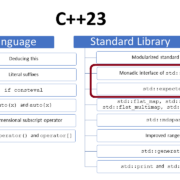C++ Core Gudelines: goto considered Evil
If you can’t throw an exception and can’t use final_action (finally) from the guideline support library, you have a problem. Exceptional states require exceptional actions: goto. Really?

I was pretty surprised to read the guidelines about goto exit; the final rescue. Here are the remaining rules for error handling in the C++ core guidelines.
- E.25: If you can’t throw exceptions, simulate RAII for resource management
- E.26: If you can’t throw exceptions, consider failing fast
- E.27: If you can’t throw exceptions, use error codes systematically
- E.30: Don’t use exception specifications
- E.31: Properly order your
catch-clauses
The first three rules are quite related; therefore, I will write about them together.
E5: If you can’t throw exceptions, simulate RAII for resource management, E.26: If you can’t throw exceptions, consider failing fast, and E.27: If you can’t throw exceptions, use error codes systematically
The idea of RAII is quite simple. If you have to take care of a resource, put the resource into a class. Use the class’s constructor for the initialization and the destructor for the destruction of the resource. When you create a local instance of the class on the stack, the C++ runtime takes care of the resource, and you are done. For more information on RAII, read my previous post Garbage Collection – No Thanks.
What does it mean to simulate RAII for resource management? Imagine you have a function func which exists with an exception if Gadget can’t be created.
void func(zstring arg) { Gadget g {arg}; // ... }
If you can not throw an exception, you should simulate RAII by adding a valid method to Gadget.
error_indicator func(zstring arg) { Gadget g {arg}; if (!g.valid()) return gadget_construction_error; // ... return 0; // zero indicates "good" }
 Modernes C++ Mentoring
Modernes C++ Mentoring
Do you want to stay informed: Subscribe.
In this case, the caller has to test the return value.
Rules E.26 is straightforward. If there is no way to recover from an error such as memory exhaustion, fail fast. If you can’t throw an exception call std::abort that causes abnormal program termination.
void f(int n) { // ... p = static_cast<X*>(malloc(n, X)); if (!p) abort(); // abort if memory is exhausted // ... }
std::abort will only cause an abnormal program termination if you don’t install a signal handler that catches the signal SIGABRT.
The function f behaves such as the following function:
void f(int n) { // ... p = new X[n]; // throw if memory is exhausted (by default, terminate) // ... }
Now, I will write about the non-word goto in rule E.27.
In case of an error, you have a few issues to solve according to the guidelines:
- how do you transmit an error indicator from out of a function?
- how do you release all resources from a function before doing an error exit?
- What do you use as an error indicator?
In general, your function should have two return values. The value and the error indicator, therefore, std::pair is a good fit. Releasing the resources may quickly become a maintenance nightmare, even if you encapsulate the cleanup code in functions.
std::pair<int, error_indicator> user() { Gadget g1 = make_gadget(17); if (!g1.valid()) { return {0, g1_error}; } Gadget g2 = make_gadget(17); if (!g2.valid()) { cleanup(g1); return {0, g2_error}; } // ... if (all_foobar(g1, g2)) { cleanup(g1); cleanup(g2); return {0, foobar_error}; // ... cleanup(g1); cleanup(g2); return {res, 0}; }
Okay, that seems to be correct! Or?
Do you know what DRY stands for? Don’t Repeat Yourself. Although the cleanup code is encapsulated into functions the code has a smell of code repetition because the cleanup functions are invoked in various places. How can we get rid of repetition? Just put the cleanup code at the end of the function and jump to it.
std::pair<int, error_indicator> user() { error_indicator err = 0; Gadget g1 = make_gadget(17); if (!g1.valid()) { err = g1_error; // (1) goto exit; } Gadget g2 = make_gadget(17); if (!g2.valid()) { err = g2_error; // (1) goto exit; } if (all_foobar(g1, g2)) { err = foobar_error; // (1) goto exit; } // ... exit: if (g1.valid()) cleanup(g1); if (g2.valid()) cleanup(g2); return {res, err}; }
Admitted, with the help of goto the overall structure of the function is quite clear. Just the error indicator (1) is set in case of an error. Exceptional states require exceptional actions.
E.30: Don’t use exception specifications
First, here is an example of an exception specification:
int use(int arg) throw(X, Y) { // ... auto x = f(arg); // ... }
This means that the function used may allow throwing an exception of type X, or Y. If a different exception is thrown, std::terminate it is called.
Dynamic exception specification with argument throw(X, Y) and without argument throw() is deprecated since C++11. Dynamic exception specification with arguments is removed with C++17, but dynamic exception specification without arguments will be removed with C++20. throw() is equivalent to noexcept. Here are more details: C++ Core Guidelines: The noexcept Specifier and Operator.
If you don’t know the last rule, it can be astonishing.
E.31: Properly order your catch-clauses
An exception is cached according to the best-fit strategy. This means the first exception handler that fits an actual exception is used. This is why you should structure your exception handler from specific to general. If not, your specific exception handler may never be invoked. In the following example, the DivisionByZeroException is derived from std::exception.
try{
// throw an exception (1)
}
catch(const DivisionByZeroException& ex){ .... } // (2)
catch(const std::exception& ex{ .... } // (3)
catch(...){ .... } // (4)
}
In this case, the DivisionByZeroException (2) is used first for handling the exception thrown in line (1). If the specific handler does not work, all exceptions derived from std::exception (3) are caught in the following line. The last exception handler has an ellipsis (4) and can, therefore, catch all exceptions.
What’s next?
As promised, I will write in the next post about the five rules for constants and immutability in C++.
Thanks a lot to my Patreon Supporters: Matt Braun, Roman Postanciuc, Tobias Zindl, G Prvulovic, Reinhold Dröge, Abernitzke, Frank Grimm, Sakib, Broeserl, António Pina, Sergey Agafyin, Андрей Бурмистров, Jake, GS, Lawton Shoemake, Jozo Leko, John Breland, Venkat Nandam, Jose Francisco, Douglas Tinkham, Kuchlong Kuchlong, Robert Blanch, Truels Wissneth, Mario Luoni, Friedrich Huber, lennonli, Pramod Tikare Muralidhara, Peter Ware, Daniel Hufschläger, Alessandro Pezzato, Bob Perry, Satish Vangipuram, Andi Ireland, Richard Ohnemus, Michael Dunsky, Leo Goodstadt, John Wiederhirn, Yacob Cohen-Arazi, Florian Tischler, Robin Furness, Michael Young, Holger Detering, Bernd Mühlhaus, Stephen Kelley, Kyle Dean, Tusar Palauri, Juan Dent, George Liao, Daniel Ceperley, Jon T Hess, Stephen Totten, Wolfgang Fütterer, Matthias Grün, Ben Atakora, Ann Shatoff, Rob North, Bhavith C Achar, Marco Parri Empoli, Philipp Lenk, Charles-Jianye Chen, Keith Jeffery, Matt Godbolt, Honey Sukesan, bruce_lee_wayne, Silviu Ardelean, schnapper79, Seeker, and Sundareswaran Senthilvel.
Thanks, in particular, to Jon Hess, Lakshman, Christian Wittenhorst, Sherhy Pyton, Dendi Suhubdy, Sudhakar Belagurusamy, Richard Sargeant, Rusty Fleming, John Nebel, Mipko, Alicja Kaminska, Slavko Radman, and David Poole.
| My special thanks to Embarcadero |  |
| My special thanks to PVS-Studio |  |
| My special thanks to Tipi.build |  |
| My special thanks to Take Up Code |  |
| My special thanks to SHAVEDYAKS |  |
Modernes C++ GmbH
Modernes C++ Mentoring (English)
Rainer Grimm
Yalovastraße 20
72108 Rottenburg
Mail: schulung@ModernesCpp.de
Mentoring: www.ModernesCpp.org








Leave a Reply
Want to join the discussion?Feel free to contribute!